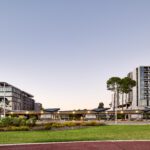Have you ever wanted to study overseas while completing a PhD?
The Aberdeen-Curtin Alliance is a prestigious program available to PhD students at Curtin University in Perth, Western Australia, and the University of Aberdeen in Scotland, and enables Curtin students to study at Aberdeen for one year of their PhD.
Combining a broad variety of study areas including business, health sciences, medicine, engineering, energy and the creative arts, students who take part in the program are jointly supervised by academics from both institutions and can obtain a joint PhD award after a successful PhD submission.
Dr. Aaron Tung recently completed a joint PhD under the Aberdeen-Curtin Alliance, co-supervised by Curtin University’s Professor Fran Ackerman, Curtin Adjunct Professor Claus Otto and the University of Aberdeen’s Professor John Paterson. We caught up with him to chat about his experience.
1. Tell us about your PhD.
My PhD focused on two areas: stakeholder management and regulatory law. The topic of the project was focused on developing stakeholder-oriented critical paths for decommissioning offshore oil and gas projects. Through the research, we also came up with a couple of recommendations to help regulators and governments improve the way they regulate decommissioning activities as well.
2. Why did you decide to study a joint PhD?
When I was growing up, I always loved learning new stuff. Even today, I always push myself to explore and learn new things. And that was why I wanted to do a joint PhD under the Aberdeen-Curtin Alliance; the program allowed me to experience and contribute to different landscapes, difference arenas and gain a different experience in the research world. It’s not just focused on one small area in one small part of the world by having that breadth and width of experience.
3. Tell us about your experience during your PhD.
If I had to rate my PhD experience, it would be 100 out of 10. It was better than I expected and that’s partly because of my supervisors; they always went out of their way to help me develop and make changes to plans on the fly. The timing of when the research was conducted lined up really, really well with what was happening within the industry and what’s going on within the regulatory environment. It all just tied together quite nicely, so the experience was very good.
4. Tell us about your academic supervisors.
My supervisors are well recognised experts in the decommissioning world. I was co-supervised by Curtin’s John Curtin Distinguished Professor Fran Ackerman, renowned for her expertise in understanding decommissioning stakeholders here in Australia, and Curtin Adjunct Professor Claus Otto, who is the Director of the Curtin Institute for Energy Transition. From Aberdeen, I was co-supervised by Professor John Paterson who is the legal expert on decommissioning in the UK. They all have an extensive network and connection within industry, which served as a great starting point for building my network and knowledge base.
5. How did the experience help with your career?
Throughout my research journey, I had the opportunity to work and collaborate with more than 50 different industry experts and likeminded people in the decommissioning space to develop better ways of managing decommissioning projects and enhancing the regulatory environment.
Those connections have been the most useful for what I am working on now as I was able to utilise my connections to my advantage in the planning and execution of real-life decommissioning projects.
At the moment, I am project engineer supporting more than 10 decommissioning projects across Australia and Trinidad & Tobago at Woodside, in which I was able to worked together of the people that I have connected in the past, to come up with innovative solutions.
6. What was it like studying on campus at Aberdeen / Curtin?
The atmosphere is different. Curtin’s buildings are more modern looking, whereas Aberdeen has buildings that are over a hundred years old. It’s more of a different way of learning as well. And it’s particularly the cultural experience part. You know, eating haggis in the park, bonfires and all those things. It opens your eyes up to things that are different in UK traditions. And in some sense, it also impacted the results of my research. Not in terms of influencing the results, but people in the UK behave in a certain way and they tend to be a little bit more methodical, and that is reflected in how they plan and deliver the commissioning projects in the UK. Here, it’s a bit more open.
7. What were some of the challenges and opportunities of being in the program?
As I was in the first batch of PhD students in the program, the challenges were more logistical because everybody was still learning how to navigate research across the two institutions. I recommend allowing plenty of time to prepare beforehand, and make sure you have your finances sorted before you go. For example, it’s important to make sure you have a bank account set-up in the UK as soon as you can, so you can access funds when you arrive. Your supervisor at Aberdeen can provide guide you in the right direction.
In terms of opportunities, it was the opportunities that were given to me from both universities. Despite COVID, I managed to present at five or six different conferences in multiple different countries, which opened more opportunities to network. One of the things that is super interesting to me now, is that the people that helped me in my PhD are the same people who are my contractors, colleagues and clients.
8. What would you say to someone considering applying to study a joint PhD through the Aberdeen-Curtin Alliance?
I would say go for it. You’ve got nothing to lose. To me, a joint PhD gives you more breadth, more access to things beyond just a single university. And you get to be exposed to and learn from multiple different more people as well. Maybe the only challenges from that is, well, I probably spent too much time in the stakeholder world. You have more stakeholders to manage if you’re doing a joint PhD, but the experience and the exposure you get from the joint PhD, compared to a single PhD, is definitely worth it.
If you’re ready to embark on a joint PhD, build your global network and make the most of a rewarding interdisciplinary and cross-institutional experience, discover more about the joint programs available now.



